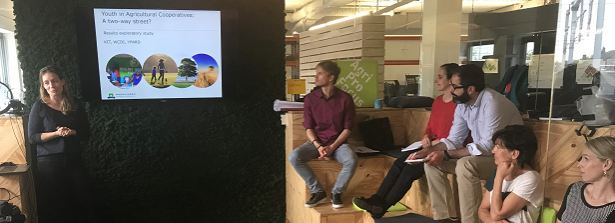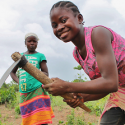Changing food systems and the power of youth

On May 22, 2018, a Community of Practice (CoP) meetup around youth in agribusiness and food systems was facilitated by AgriProFocus and the Food & Business Knowledge Platform. The objective of the CoP is to share recent work on youth in food systems, provide feedback on each other’s work, identify knowledge questions and ideas for joint action, find innovative solutions for urgent issues, and to get to know other stakeholders working in this field as well as inspiration for collaboration.
Organizing of youth for changing food systems
This meetup zoomed in on how youth organize themselves around issues in the agriculture and food sector. In many development policies and programmes, there is a growing emphasis on the need to involve youth in agriculture in order to create employment, build up livelihood opportunities and engage in community development. The argument is often made that youth themselves can act as change makers, leaders, entrepreneurs, productive economic assets and social disruptors within their communities, sectors and countries. Much has been done to develop skills, education opportunities and employment placements for young people with a host of different interventions. However, how young people, and the organizations they lead, are trying to effectively change the way food systems work is relatively unexplored terrain. There is still much we can learn from the diversity, creativity and different organizational approaches through which young people contribute to change and food system innovations.
Sharing insights around organizing of youth
An agricultural cooperative is an organizational structure which should offer youth opportunities that they would not be able to access as individuals, such as through demo-plots or internal lending structures. Associations, groups, hubs, and networks can be other forms to organize youth or ways that youth organize themselves in order to create more opportunities.
Judith Jacobs, Matilda Rizopulos and Bram Peters of the Wageningen Centre for Development Innovation (WCDI) shared insights from two studies around the organizing of youth; the recent study “Youth in Agricultural Cooperatives: Opportunities & challenges” by the Royal Tropical Institute (KIT), WCDI and the Young Professionals for Agricultural Development (YPARD); and the ongoing study by WCDI on youth-led organizations, initiatives and networks working in low and middle income countries. The latter study is building on a scan of 115 youth-led organizations, initiatives and networks working in low and middle income countries. 28 organizations that were youth-led and food system-focused were explored more closely. WCDI explored how young people are organizing to develop their own ideas, products and models to in relation to elements of the food systems. WCDI used a ‘social innovation lens’, to try to assess in which ways these collectives introduce new ideas and deviate from ‘business as usual’.
Youth in agricultural cooperatives: a two-way street?
The study on cooperatives shows that for youth to penetrate in existing formal organizational structures, many hurdles have to be overcome. Members, but boards as well, often tend to see youth as competitive forces that might threaten their position in the organization. This seem to correspond to what is also noted in family run farms, where the management and resources (land, capital) are handed over to the new generation only after the decease of the paterfamilias. In short, many cooperatives seem not very proactive towards youth. In return, this also stimulates distrust amongst youth themselves in seeing cooperative as an institution but also in general trust doesn’t come easy.
There seems to be quite a gap between generations, while in fact the older and younger generations can learn a lot from each other. It is believed that might be the key to bridging that gap: highlighting the complementary knowledge of young and old regarding issues like agricultural practice, market knowledge, networks, network building, ICT and innovations in general. Other recommendations on youth inclusion in agricultural cooperatives and agricultural transformation based on the findings of this study can be found in the report.
Examples of youth-led social innovation
Besides youth involvement in formal structures, a wide variety exists of organizations, networks and platforms that are being created by youth – from individual initiatives working in local communities, to global networks of young students, as the mapping showed. Some are typically “Youth for youth”, others concern “Youth for All” objectives. It is quite difficult to figure out the spectrum of youth-led initiatives. Formal organizations are quite easy to map; internet is a great help as they all present themselves prominently there. The informal world of youth-led organizations however – think about local youth groups and other informal networks, and the huge number of initiatives where youth groups are sub-sets of other organizations – is much more difficult to penetrate and to research.
It seems that many of these youth-led initiatives are developing in the form of social enterprises and businesses on the one hand, and organizing in civil society networks on the other. In Africa it was found that quite a few young entrepreneurs are initiating social enterprises through incubation hubs and start-ups trajectories. Other examples often found related to young entrepreneurs developing or applying new technologies for agricultural production or value chain marketing.
Youth specific and youth mainstreaming
Both examples of on the one hand organizing of youth through existing structures such as agricultural cooperatives and on the other hand new forms of youth-led organizations complemented each other very well. It relates to ongoing discussions on the importance of having both youth-specific projects as well as youth mainstreaming in existing and new projects. Many of the organizations present at this CoP meetup could relate their experiences to the findings of both studies. For example, Agriterra is trying to stimulate youth involvement in agricultural cooperatives through youth councils. And Marula is researching and stimulating several youth initiatives in the Ugandan coffee sector, as well as really trying to understand the youth specific challenges.
An important note: when developing initiatives and actions that concern youth, asking them about what support they think they need should be a good strategy to build a successful action. Also involving them in the development and in the implementation should be a good strategy, as the mapping shows that many youth find their own way, with or without our support.
_ _ _
Are you interested in joining the next CoP meetup, or do you have interesting insights from your work around youth in food systems that you would like to share with this community? Please contact us:
- Rolf Schinkel, AgriProFocus ()
- Babs Ates, Food & Business Knowledge Platform ()






